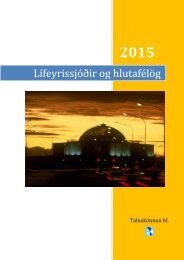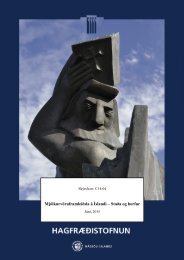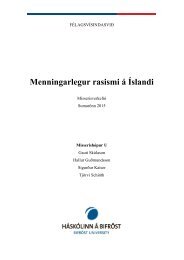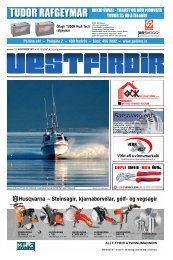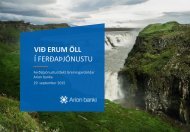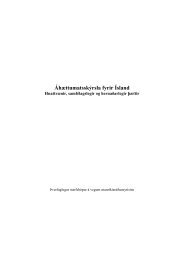Create successful ePaper yourself
Turn your PDF publications into a flip-book with our unique Google optimized e-Paper software.
WORLD REPORT 2016<br />
HUMAN RIGHTS WATCH<br />
ing contracts or other disputes; and an anti-corruption campaign that doubles as<br />
a political purge.<br />
These top-down policies, unconstrained by independent public debate, have<br />
contributed to economic slowdowns if not recessions. And as waning fortunes<br />
raise questions about the rulers’ efficacy, both Russia and China have embarked<br />
on crackdowns not seen in decades.<br />
First in response to the anti-Putin protests in 2011 and 2012, and accelerating as<br />
the Kremlin stoked nationalism to boost its vision of a new identity for Russia,<br />
the Kremlin has been crushing Russian civil society, one of the most important<br />
elements to have emerged from the demise of Soviet rule. The new, poisonous<br />
atmosphere helped the Kremlin to divert attention as Russia’s economic woes<br />
deepened.<br />
Meanwhile the Chinese government, recognizing at some level the need to meet<br />
people’s rising expectations, speaks of the rule of law and selectively prosecutes<br />
officials for corruption, but is also arresting the lawyers and activists who<br />
have the audacity to pursue these goals outside of government control. Needless<br />
to say, a government-manipulated legal system is not the rule of law, while a<br />
selective government crackdown on corruption undermines the much-needed<br />
establishment of a functional, independent legal system.<br />
Similar trends are evident elsewhere. For example, one feature often found behind<br />
efforts to repress civil society are officials’ attempts to evade the threat of<br />
prosecution or other consequences of illegal activity:<br />
• Turkey’s then prime minister (now president), Recep Tayyip Erdoğan, began<br />
his crackdown—the most intense in at least a decade—after large street<br />
protests against his increasingly autocratic rule. He reinforced it when<br />
audio tapes emerged suggesting that he and his family were directly involved<br />
in corruption. When his party, in office for three terms, received a reduced<br />
plurality at the polls in June, the president intensified the crackdown<br />
on media and political opponents and was able to secure victory in a rerun<br />
of the election in November.<br />
• Some senior officials in Kenya have attacked civil society organizations for<br />
supporting prosecution by the International Criminal Court (ICC) of those<br />
who allegedly directed the 2007-2008 post-electoral violence, including<br />
Deputy President William Ruto. Kenya has also targeted civic groups that<br />
have documented security force abuses in the context of counterterrorism<br />
efforts against increased gun and grenade attacks in various parts of the<br />
country.<br />
• Sudan expelled humanitarian organizations from Darfur in response to the<br />
March 2009 ICC arrest warrant for President Omar al-Bashir, and shut down<br />
groups that publicly promote justice and human rights.<br />
• President Jacob Zuma’s government in South Africa targeted the group that<br />
had obtained a court ruling against its welcoming of Bashir, whose ICC arrest<br />
warrants the government openly flouted.<br />
• As global outrage mounted over its expanding illegal settlements, Israel<br />
adopted a law—affirmed in 2015 year in most elements by the Supreme<br />
Court—that could be used to penalize civil society groups, as well as individuals<br />
calling for cutting economic or other ties with settlements or Israel.<br />
Other governments have acted when elections or term limits threaten their continuation<br />
in power:<br />
• In Burundi, the government launched intense and often violent attacks on<br />
civil society after widespread protests against President Pierre Nkurunziza’s<br />
decision to seek a constitutionally questionable third term. Most notably, a<br />
gunman shot and seriously wounded the country’s foremost human rights<br />
defender, Pierre Claver Mbonimpa. Two of his close relatives were killed in<br />
separate incidents.<br />
• In the Democratic Republic of Congo, human rights defenders and prodemocracy<br />
youth activists have been jailed, beaten, and threatened after<br />
organizing peaceful protests and speaking out against the possible extension<br />
of President Joseph Kabila’s term beyond the constitution’s two-term<br />
limit. Government officials claimed without foundation that the activists<br />
were plotting “terrorist activities” or “violent insurrection,” while security<br />
forces used lethal force to disrupt the groups’ peaceful demonstrations.<br />
• Venezuelan President Nicolás Maduro harassed, arrested, and demonized<br />
critics and civil society groups in the months leading up to legislative elections—which<br />
he ultimately lost, most observers believe, because of his<br />
mismanagement of the economy.<br />
10<br />
11



